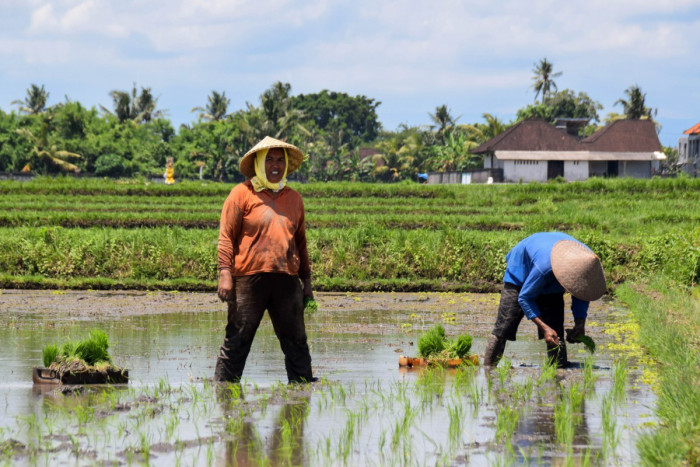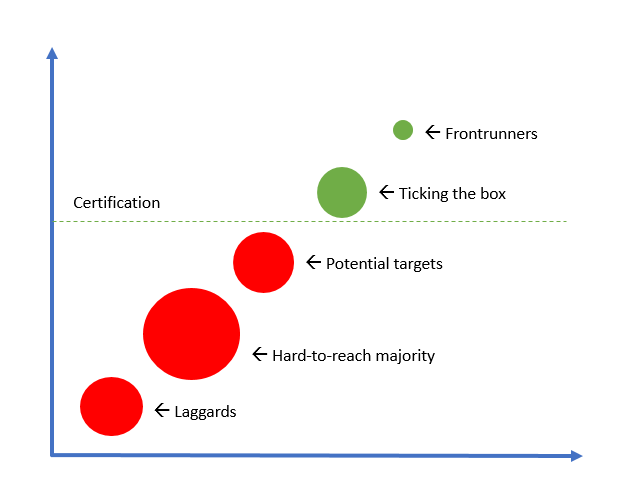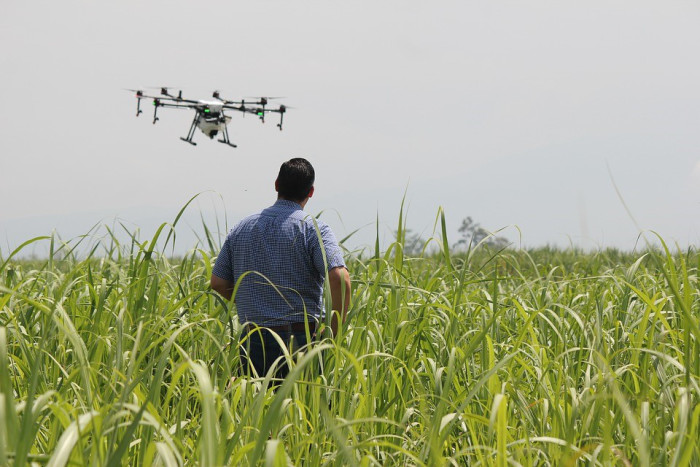Better or Beyond Certification?
Ensuring sufficient, adequate and sustainable food for all is one of the 21st century’s key challenges. Over the past decades, certification schemes have emerged as widely accepted tools to overcome this challenge. The idea behind certification is that by promoting the consumption of sustainable products, actors in the supply chains are incentivized to move towards sustainable production. However, an increasing number of people and organizations realize that certification is not the silver bullet as it seemed to be.
Andre de Freitas, director of the Sustainable Agriculture Network (SAN) – the organization that founded Rainforest Alliance – announced that the organization had stopped working with certification in agriculture altogether, because of various limitations of the instrument. Nico Roozen, director of Solidaridad – one of the founding fathers of Fair Trade certification – also recently expressed the importance to acknowledge the overpromise of the tool and the need to look beyond certification.

Rice farmers in Indonesia. Foto: open source
Such statements may not be a surprise given the various weaknesses that most certification schemes bear. Perhaps the weakest point is impact, or rather the lack thereof. Study after study shows that certification does not necessarily lead to improved sustainability or better incomes for farmers. A recent systemic review concludes that “certification schemes have unclear impact on the wellbeing of farmers and workers”. I believe this lack of impact can be attributed to various causes:
- Certification is expensive. Most schemes rely on third party auditing agencies to verify compliance with their standards. These transaction costs are high and farmers have to pay for these costs themselves or in a group. Due to the variety of certifications and labels in the market, farmers need to obtain more than one certification, with the additional transaction costs related to it. Auditors are usually accredited by another organization, adding to the costs of the system as a whole. What is more, annual audit visits (announced or even the unannounced) are not necessarily the most adequate form of verification. Altogether this leads to a verification system in which there is a downward pressure on the quality of verification.
- Certification does not ensure rewards. Although in theory the market would reward certified producers, this is not the case in practise. Even if there is a higher farm gate price or improved productivity, the high costs often cancel out these benefits. Moreover, as producers obtain a certification for all their annual production, they usually do not succeed to sell all their production under that certification and have to make up for their certification costs with a part of their sales.
- Certification is complex. The standards that food producers have to adhere to are complex, lengthy documents that are difficult to implement in practice. This also leads to heavy documentation requirements, creatinga barrier for small-scale farmers with little or no education. The standards tend to be far off from the realities of farmers living in poverty. Together with the high auditing costs, this leads to unfair competition with large farms that have the resources and capacity to deal with the transaction costs and complexity.
- Certification is limited. Any scheme has its limitations: some include social criteria, others do not. Some are applicable to the entire supply chain, others focus on one stage only. This has resulted in a proliferation of schemes with different labels, leaving the consumer confused.
- Consumer demand for certified products is limited. Conscious consumerism is growing, but mostly in selected Northern markets. There is a limit of what can be achieved by relying on consumer demand, especially considering the low interest of consumers in rapidly growing Southern markets.
Because of these reasons, certification does not reach the impact and scale that it aims for. Many farmers are ‘left out’ or simply do not see the benefits. The theory of change of certification appears to have flaws – or so I believe. It does not reach the people and places where most improvements need to be made. The idea of ‘if you like it, put a label on it’ is simply not enough. Simon Bush and co-authors refer to this as the ‘devils triangle’ of certification: ensuring credibility, continuous improvement and accessibility at the same time seems to be a big challenge.
I am convinced that the reason that certification is not as effective as hoped for, is that it does not deal with systemic pressures arising from market dynamics. As long as there is a downward pressure on the prices of agricultural products because of competition, consolidated market power or ‘price wars’ amongst retailers, certification can only serve as a band-aid solution.

The playing field of certification. Currently mostly those just ticking the box are rewarded. There is still a pool of potential targets that almost meets the standards. However, the real challenge is to reach the hard-to-reach majority of food producers. Credit: Sake Kruk/ Oxfam Novib
These are good reasons to start looking beyond certification for alternative solutions. But what lies beyond this horizon is still undefined. In the fuzzy search for ways to transform our food system, a few alternatives start to crystalize (NB: this list is not exhaustive):
- Making retailers responsible
Instead of setting standards for production, norms can also be set to retailers. In the end, they are accountable for the sourcing of the products they put on their shelves. As powerful and resourceful actors in food supply chains, retailers are able to carry the responsibility of ensuring adequate and sustainable food. This reverses the burden of proof. In practice, this means that retailers will implement so-called due diligence assessments on the social and environmental risks of their products. To encourage this, it is even imaginable to certify retail instead of production. Such due diligence assessments can also be applied throughout a value chain.
- Landscape approaches
Instead of regarding food production as part of a value chain, we can also regard farms and food producers as part of a wider ecological and social landscape in which resources such as land and water have to be shared with other landscape functions and users. Bringing together all different stakeholders in a geographical area to come to an agreement on how to best use the landscape is an alternative way of ensuring the sustainability of food production.

Using drones for monitoring . Foto: Open source
3. Technological solutions
Technological solutions provide alternative ways of promoting and monitoring sustainable food production. Data-driven monitoring using technologies such as satellite imagery, geodata, drones, mobile phones and monitoring devices linked to the internet (‘the internet of things’) provide opportunities for remote monitoring as an alternative to third party certification. Blockchain technology enables the traceability of products without the need of a certifier and can even set preconditions on so called ‘smart contracts’, which are automatically verified using data-driven monitoring.
These approaches – and undoubtedly there are others (for example due diligence systems throughout a value chain or multi-stakeholder initiatives per value chain) – provide solutions for some of the challenges of certification. However, they all have shortcomings of their own. Instead of ‘throwing the baby out with the bath water’, I believe that improving certification schemes will help facing the food challenges of this century. For example, by reducing the complexity of standards for smallholders. The Roundtable on Sustainable Palm Oil (RSPO) recently introduced a smallholder strategy, in which it defines ‘core sustainability criteria’ which simplify the certification for smallholders. Various organizations have also started developing ‘improvement programs’ that explicitly target hard-to-reach producers. Although not addressing all flaws, such improvements show that there are still opportunities to increase the effectiveness of certification schemes. Along the same lines, due diligence, landscape approaches and technological solutions can serve as complimentary and mutually reinforcing instruments with certification. The common definitions and standards that have been set by certification initiatives form a valuable point of departure in this respect.
The question is not so much whether certification schemes should be put in a coffin, but what can be realistically achieved building on such schemes through improvements, and what cannot be expected from certification – for which other solutions are needed. I believe that we need both better certification and look beyond it for alternative and complementary solutions, that can mutually reinforce each other. For me the crucial point is to empower farmers, farm workers and communities to make necessary changes, whilst retailers and traders at the same time take up their responsibility as central points in the food system. Only in that way we can face the food challenges fruitfully and make global food markets truly sustainable.
This article was written by Sake Kruk. Sake is intern at the Food, Land and Water unit, in the ALIVE team (Access to Land, Inclusive Value Chains, and Empowerment). He works on promoting inclusive value chains and building capacity for private sector influencing strategies. Contact Sake on LinkedIn!
The views and opinions expressed in this article are those of the author.




